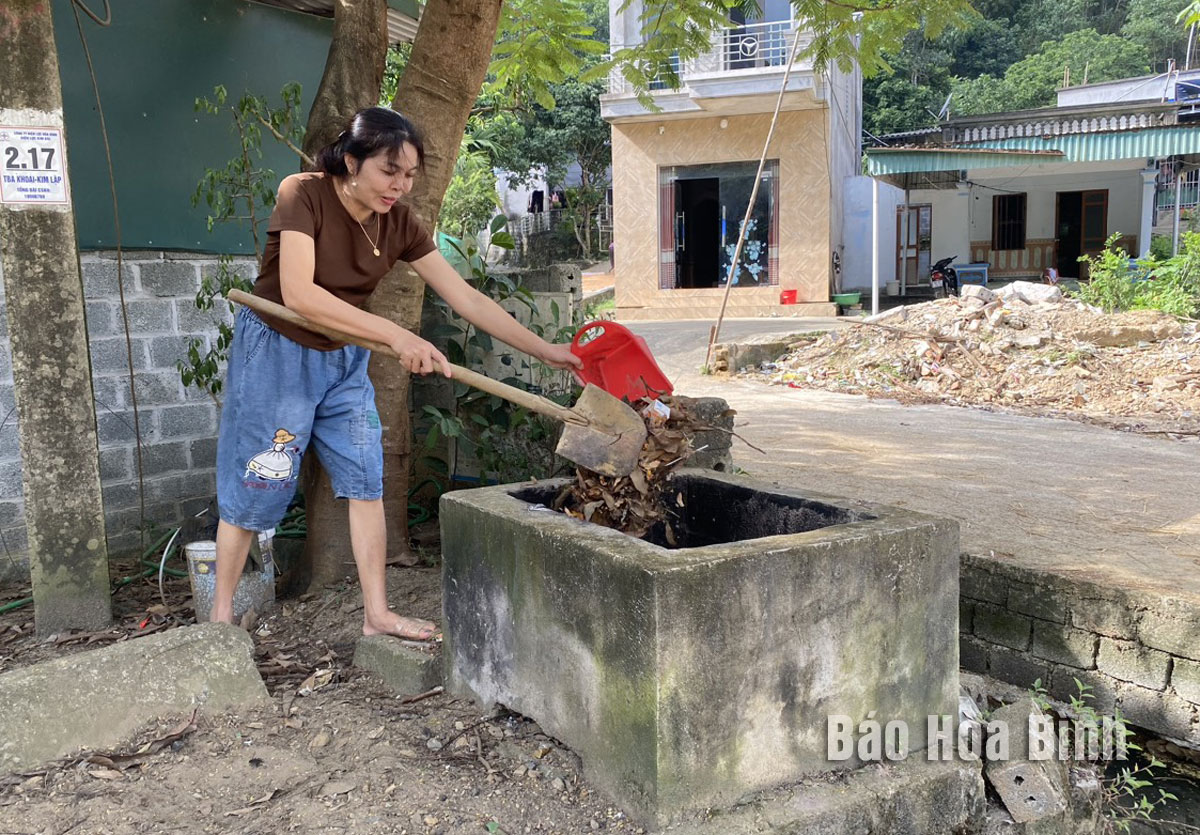
(HBO) - Currently, the implementation of the environment-related criteria in the new-style rural area building programme, particularly rural waste treatment, has received due attention. As building centralised waste treatment areas is not yet possible, building mini brick incinerators at households is a useful model that is proving effective.

A woman in Mo hamlet, Kim Lap commune (Kim Boi), collects and treats garbage at a mini incinerator, contributing to reducing environmental pollution.
Previously, due to living habits, most of the waste of households in Kim Lap commune (Kim Boi) was not treated but mainly thrown into ditches and on streets, causing environmental pollution and adversely affecting people's health. To solve this problem, in 2020, the Kim Lap Farmers' Association disseminated and encouraged locals to build mini trash incinerators at households to collect, process, and limit waste generated into the environment.
Muon is one of the hamlets with the most mini waste incinerators (150). Villagers now no longer see piles of garbage on the roads in the locality. In addition, families are also aware that protecting the environment is a shared responsibility of each person as well as the whole society, so they classify their own waste. Dry garbage is burned in mini incinerators, while fresh garbage that cannot be burned is buried in gardens.
Bui Thi Luc in Muon hamlet shared: "When there was no trash incinerator, every day when I came home from the market, I often threw plastic bags into the garden. Although the family also dug a hole to bury trash in the garden, household waste could not be thoroughly treated. Since the mini waste incinerator was built, there is no longer a situation of littering, the house is clean, the ash from burned garbage and by-products from vegetables and fruits used to compost as fertiliser for plants.”
The building of mini incinerators is simple, easy to implement, and does not take up space, and it can treat household waste on-site, thus helping locals develop a habit of classifying and treating waste on site. In addition, the amount of emissions when burning does not spread to residential areas, so it receives positive response of a large number of people. To date, Kim Lap commune has over 400 brick incinerators built in households, which have initially showed good efficiency of basically solving the amount of waste at home, gradually forming the habit of maintaining hygiene and addressing environmental pollution.
Playing a key role in Hoa Binh province’s economic development, Luong Son district has been focusing on science and technology development, innovation, and digital transformation.
Identifying the application of online public services as a key step in administrative procedure reform and e-government building, Kim Boi district has proactively provided services and supported residents and businesses in accessing and utilising full-process online public services promptly and efficiently. The locality aims to lift the rate of end-to-end online public services to over 90%, with all officials and civil servants handling tasks in the digital environment.
Nguyen Anh Tuyet, hailing from a family steeped in the ancient art of herbal medicine, is transforming local medicinal herbs into high-value concentrated extracts, elevating their worth and healing potential.
Nguyen Phi Long, an alternate member of the Party Central Committee, Secretary of the Hoa Binh provincial Party Committee, and head of the steering committee for the province's key projects, chaired a conference on March 25 to discuss measures for implementing the project on constructing the Hoa Lac - Hoa Binh road and upgrading the Xuan Mai - Hoa Binh section of National Highway 6 under the public-private partnership (PPP) model.
Administrative reform has been identified as a key priority in enhancing state governance, improving the business environment, and facilitating services for citizens and enterprises.
The Standing Board of the Hoa Binh provincial Party Committee met on March 18 to review and guide major investment projects aimed at boosting local socio-economic development.



